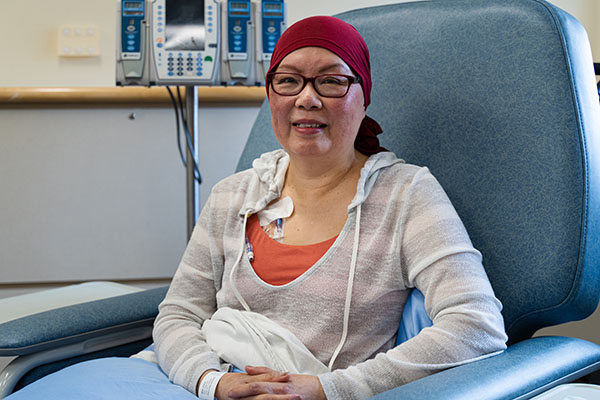The mammogram that changed everything – The journey of Sharon, a breast cancer patient
Sharon Tay had never been admitted to hospital. As a healthy, active 62-year-old, she has always been diligent about her annual check ups and doctor visits. So, when she received an unexpected call following a standard bone density test and mammogram in March 2021, she immediately had a sinking feeling something was wrong.
 “When I was called to come back for a second mammogram, I immediately knew that something wasn’t right,” says Sharon. “With no history of breast cancer in my family, I held on to the hope that whatever was discovered in the first mammogram was nothing serious.”
“When I was called to come back for a second mammogram, I immediately knew that something wasn’t right,” says Sharon. “With no history of breast cancer in my family, I held on to the hope that whatever was discovered in the first mammogram was nothing serious.”
Unfortunately, Sharon’s second mammogram confirmed her worst fear. In early April 2021, she was diagnosed with estrogen (ER) and progesterone (PR) negative, but HER2-positive breast cancer, an aggressive type of breast cancer that tests positive for a protein called human epidermal growth factor receptor 2 (HER2), which promotes the growth of cancer cells.
Filled with fear and uncertainty, Sharon trusted her Mackenzie Health care team to guide her through this difficult time.
“For someone going through a really tough time with such an aggressive diagnosis, my experience at Mackenzie Health and with the Mackenzie Health staff has been nothing but pleasant and reassuring,” says Sharon. “From the oncologists to the surgeons, to the nurses, to the imaging team, everyone is just so wonderful, knowledgeable, attentive, kind and patient. Even the volunteers are always smiling and very supportive. It’s truly a blessing to get treatment in such a positive environment.”
Alongside the supportive and compassionate care she’s received, Sharon also says having access to the latest in technology for her treatments made her journey easier. For example, Sharon underwent a Radioactive Seed Localization (RSL) procedure before going through lumpectomy (partial mastectomy), where a tiny metal seed, about the size of a small sesame seed, is placed into abnormal breast tissue to mark its location. The seed contains a small amount of radiation which helps the surgeon, using a special tool, to find the breast seed and the surrounding abnormal tissue and then take them out.
“We started using RSL at Mackenzie Health a little over a year ago and it brought many benefits to our patients as well as our operations, “says Dr. John McKee, Radiologist at Mackenzie Health. “Compared to the wire localization procedure, RSL can be done a couple of days before the surgery, making it more convenient for patients to go home without worrying about a wire sticking out from the area that’s being operated on. RSL also enhanced the scheduling process, reducing the wait time for patients and allowing our surgeons to operate on more patients daily. Most importantly, RSL provides increased accuracy over wire localization which prevents the need for a potential second surgery.”
Sharon recently successfully completed 16 rounds of chemotherapy and will now continue her radiation treatment daily for five weeks while also continuing treatment with Herceptin, an intravenous drug that is used to prevent recurrence of breast cancer, until July 2022.
Her positive attitude, strong faith and love for life gave Sharon the strength and ability to live a normal life. Sharon was adamant to continue working in her role of 30 years as an insurance broker and team lead through her diagnosis and treatment. She also continues to be involved in her bible study classes which she’s been doing for the past eight years. And as foodies, Sharon and her husband didn’t let this cancer diagnosis stop them from enjoying their hobby of discovering and trying new restaurants whenever they can.
“Being diagnosed with breast cancer can be scary, but when you have a care team that you can trust as I do at Mackenzie Health, a solid treatment plan and an incredible support system, everything becomes easier, “says Sharon. “It’s important to take the time to understand what your diagnosis means for you personally and your family. Learning quickly to accept the unexpected change, allowed me to move forward. No one can walk this journey for you, but your loved ones can walk it with you. Take it one day at a time, one appointment at a time, one chemotherapy treatment at a time. Don’t let fear stop you from having a good life. No matter how tired you are or how difficult it gets, don’t give up. Just take it one moment at a time.”